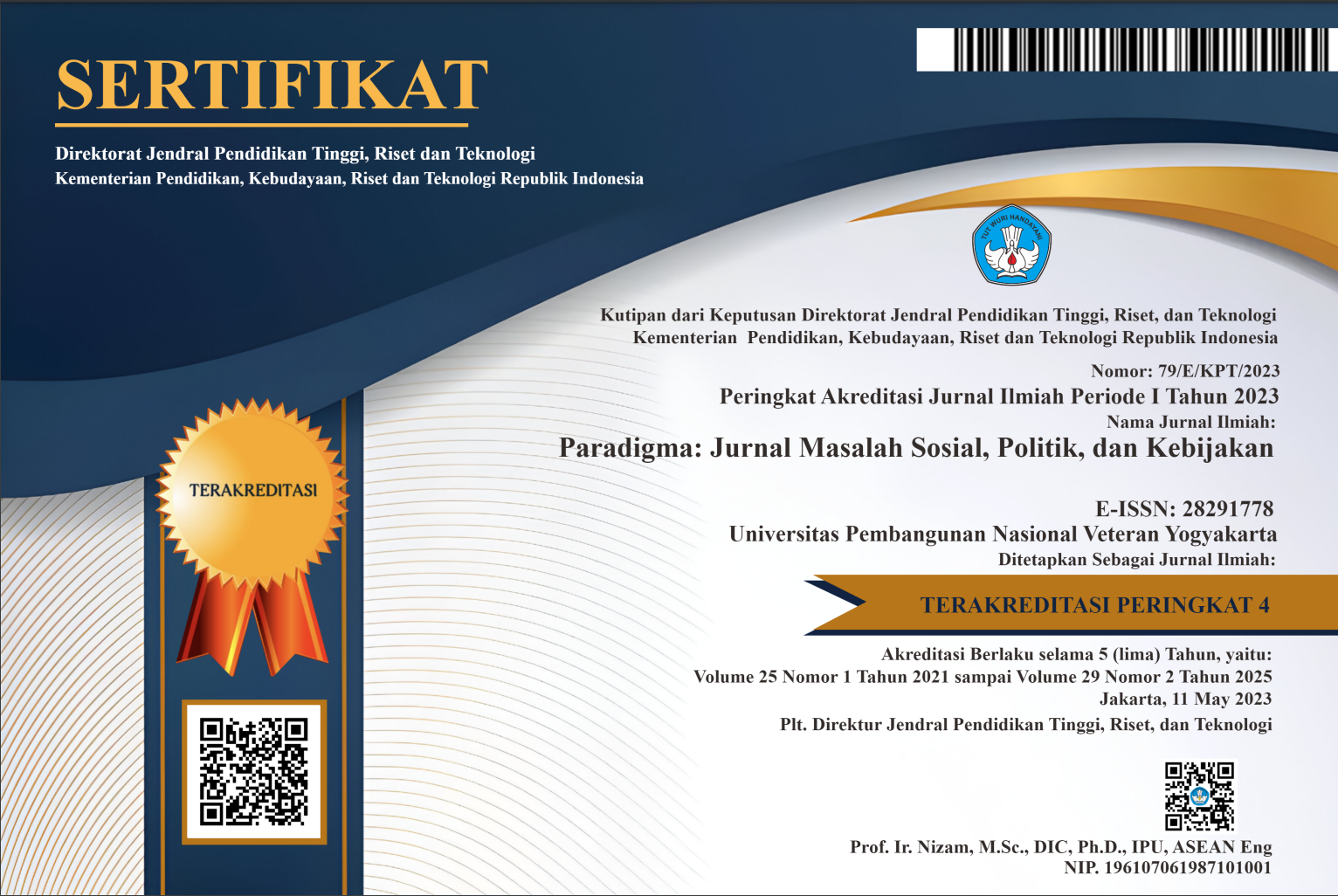Pentingnya Pengetahuan: Menyelidiki Pengaruh Literasi Keuangan terhadap Perilaku Keuangan di Kalangan Gen Z
Abstract
Gen Z faces difficulties in managing finances wisely, such as difficulties in making ends meet from the income they have and worries about their ability to meet their expenses. Gen Z's financial behavior is associated with changes in consumption patterns that are influenced by technological advances and the rapid development of the times. This factor is often accompanied by a lack of social responsibility and a lack of financial planning, including saving, investing, planning emergency funds, and allocating funds for the future. The purpose of this study was to determine the effect of Financial Literacy on Financial Behavior in UPN Veteran Yogyakarta students. The population used in this study were UPN Veterans Yogyakarta students and the sampling technique used was a purposive sampling technique because it requires certain criteria to answer research problems with the sample criteria being active students from Yogyakarta National Development University, class of 2019-2022 whose average age is 18 -20 years. The samples taken were 250 respondents. In this study it was concluded that financial literacy has a significant positive effect on financial behavior. The better one's level of financial literacy, the better one's financial behavior will be.
Keywords
Full Text:
PDF (Bahasa Indonesia)References
Al Kholilah Rr Iramani, N. (2013). STUDI FINANCIAL MANAGEMENT BEHAVIOR PADA MASYARAKAT SURABAYA. In Journal of Business and Banking (Vol. 3, Issue 1).
Dwiastanti, A. (2015). Journal of Education and Practice www.iiste.org ISSN (Vol. 6, Issue 33). Online. www.iiste.org
Howlett, E., Kees, J., & Kemp, E. (2008). The Role of Self-Regulation, Future Orientation, and Financial Knowledge in Long-Term Financial Decisions.
Jefilyana, & Sarwo Edy Handoyo. (2022). PENGARUH FINANCIAL ATTITUDE, FINANCIAL LITERACY DAN FINANCIAL KNOWLEDGE TERHADAP FINANCIAL BEHAVIOR. Jurnal Manajerial Dan Kewirausahaan, 04, 938–946.
Kaiser, T., Lusardi, A., Menkhoff, L., & Urban, C. (2022). Financial education affects financial knowledge and downstream behaviors. Journal of Financial Economics, 145(2), 255–272. https://doi.org/10.1016/j.jfineco.2021.09.022
Kawamura, T., Mori, T., Motonishi, T., & Ogawa, K. (2021). Is Financial Literacy Dangerous? Financial Literacy, Behavioral Factors, and Financial Choices of Households. Journal of the Japanese and International Economies, 60. https://doi.org/10.1016/j.jjie.2021.101131
Lusardi, A., & Mitchell, O. S. (2007). Financial Literacy and Retirement Prepared-ness: Evidence and Implications for Financial Education THE PROBLEMS ARE SERIOUS, AND REMEDIES ARE NOT SIMPLE.
Lusardi, A., & Mitchell, O. S. (2014). The economic importance of financial literacy: Theory and evidence. Journal of Economic Literature, 52(1), 5–44. https://doi.org/10.1257/jel.52.1.5
Noh, M. (2022). Effect of parental financial teaching on college students’ financial attitude and behavior: The mediating role of self-esteem. Journal of Business Research, 143, 298–304. https://doi.org/10.1016/j.jbusres.2022.01.054
Purwidianti, W., & Tubastuvi, N. (2019). The Effect of Financial Literacy and Financial Experience on SME Financial Behavior in Indonesia. Jurnal Dinamika Manajemen, 10(1), 40–45. https://doi.org/10.15294/jdm.v10i1.16937
Sarstedt, M., Ringle, C. M., & Hair, J. F. (2021). Partial Least Squares Structural Equation Modeling. In Handbook of Market Research (pp. 1–47). Springer International Publishing. https://doi.org/10.1007/978-3-319-05542-8_15-2
Sirsch, U., Zupančič, M., Poredoš, M., Levec, K., & Friedlmeier, M. (2020). Does Parental Financial Socialization for Emerging Adults Matter? The Case of Austrian and Slovene First-Year University Students. Emerging Adulthood, 8(6), 509–520. https://doi.org/10.1177/2167696819882178
Soya Sobaya, M. Fajar Hidayanto, & Junaidi Safitri. (2016). PENGARUH LITERASI KEUANGAN DAN LINGKUNGAN SOSIAL TERHADAP PERENCANAAN KEUANGAN PEGAWAI DI UNIVERSITAS ISLAM INDONESIA YOGYAKARTA. Prodi Ekonomi Islam, Fakultas Ilmu Agama Islam, Universitas Islam Indonesia (UII).
Sugiyono. (2019). Metode Penelitian Kuantitatif, Kualitatif, dan R&D. Alphabet.
Ulan Sri Wahyuni, & Rike Setiawati. (2022). Pengaruh Literasi Keuangan Dan Gaya Hidup Terhadap Perilaku Keuangan Generasi Z Di Provinsi Jambi. Jurnal Dinamika Manajemen, 10.
Yuliana, M., Nurjannah, D., & Sa’diyah, C. (2023). The Effect of Financial Literacy, Personality, and Financial Attitude on Financial Behavior Management in Malang SMEs. Jamanika (Jurnal Manajemen Bisnis Dan Kewirausahaan), 3(02), 138–147. https://doi.org/10.22219/jamanika.v3i02.27363
DOI: https://doi.org/10.31315/paradigma.v28i1.11392
Refbacks
- There are currently no refbacks.
Copyright (c) 2024 Muhammad Irfan Mu'afi, S.E, M.A.B., Difansya Arkannisa Afifah, Axelliano Dinovan Binantara

This work is licensed under a Creative Commons Attribution-ShareAlike 4.0 International License.
Paradigma: Jurnal Masalah Sosial, Politik, dan Kebijakan
Published by Faculty of Social Science and Political Science
Universitas Pembangunan Nasional "Veteran" Yogyakarta
(Kampus Unit II) Jl. Babarsari 2, Tambakbayan, Depok, Yogyakarta 55281
Phone: +62 274 486733. Email: paradigma@upnyk.ac.id

This work is licensed under a Creative Commons Attribution-ShareAlike 4.0 International License.


